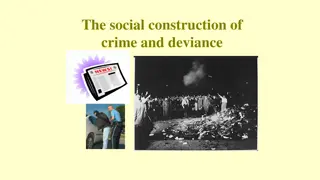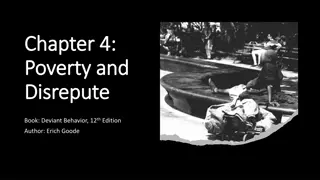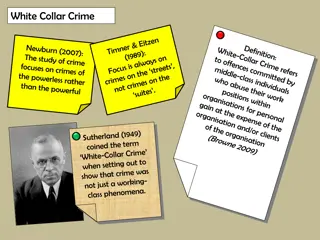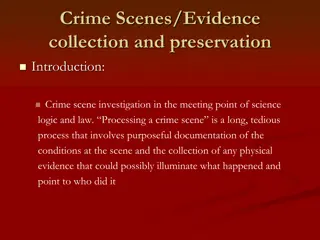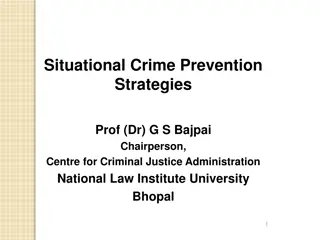Marxist Views of Crime and Deviance
Marxist theories of crime and deviance, understanding how capitalism influences criminal behavior. Delve into concepts such as alienation, selective law enforcement, and ideological hegemony. Analyze the unequal enforcement of laws and the criminogenic nature of capitalism according to Marxist perspectives.
Download Presentation

Please find below an Image/Link to download the presentation.
The content on the website is provided AS IS for your information and personal use only. It may not be sold, licensed, or shared on other websites without obtaining consent from the author.If you encounter any issues during the download, it is possible that the publisher has removed the file from their server.
You are allowed to download the files provided on this website for personal or commercial use, subject to the condition that they are used lawfully. All files are the property of their respective owners.
The content on the website is provided AS IS for your information and personal use only. It may not be sold, licensed, or shared on other websites without obtaining consent from the author.
E N D
Presentation Transcript
Crime & Deviance TOPIC 1 Marxist views of crime LESSON 1
Marxist theories of Crime and Deviance L.O. To understand Marxist theories of crime and deviance. To recognise that there are different Marxist theories of Crime and Deviance. To evaluate Marxist theories of Crime and Deviance
Marxist theories of Crime and Deviance Starter Task Here are the answers; now you write the questions! 1. Karl Marx 2. Alienation 3. Capitalist society 4. The bourgeoisie 5. Corporate crime 6. Enron Marxism explained
Marxist theories of Crime and Deviance Starter Task II Put this quotation from Marx into your own words. Refer to the idea that Capitalism causes crime. Capital comes dripping from head to foot, from every pore, with blood and dirt.
Marxist theories of Crime and Deviance Main Task Choose either or Or one of these key Marxist concepts relating to crime and deviance: Marxist theory Capitalism in general. Selective law enforcement Alienation causes crime Capitalism is criminogenic Ideological hegemony And create a poster to represent the concept you chose.
Marxist theories of Crime and Deviance Plenary Task Suggest how the following might respond to the material covered in today s lesson: A member of the bourgeoisie A member of the proletariat A politician A judge A functionalist A member of the bourgeoisie might not want other people to study the Marxist views of crime and deviance, as they highlight how privileged they are compare to poorer members of society. They might want to keep Marxists quiet in case they ruin their nice comfortable lives!
Marxist theories of Crime and Deviance Starter Task Marxist theories of crime focus on two main ideas: The unequal creation and enforcement of the law The way in which capitalism is criminogenic (it causes crime ) The nature of work in a capitalist society is alienating The ruling class make the laws The crimes of the w/c are policed more rigorously than those of the m/c The state does not want to restrict the practices of large corporations The police do not treat everybody equally Being poor leads to crime Relative cost of tax fraud and benefit fraud vs. numbers of prosecutions Relative deprivation leads to crime
Marxist theories of Crime and Deviance Main Task Prepare some questions about the nature of crime in a capitalist society to ask any of the following people: Laureen Snider Jeffrey Reiman Jeff Bezos Bernie Madoff David Gordon Karl Marx A police officer (CEO of ; who it is suggested do not pay all their taxes.) (responsible for largest ever corporate fraud of $70billion.)
Marxist theories of Crime and Deviance Plenary Task Create essay paragraphs from any of these openings: Marxists highlight 2 main issues with regard to crime: Lauren Snider agrees with Jeffery Reiman Evidence of the unequal enforcement of laws can be seen Marxists suggest that capitalism is criminogenic because David Gordon argues that One point on which Marxists and labelling theorists might agree is
Marxist theories of Crime and Deviance Starter Task 1. PR L A+ 8/10 75% 2. A 3. 4.
Marxist theories of Crime and Deviance Main task You will be assigned one of the Marxist Perspectives. You must answer the questions about the court case. CLASSICAL MARXIST William James Ramsden, you have been charged with the offences of criminal damage, to whit destruction of the front window of a Starbucks, inciting violence, violent disorder and the assault of a police office in the execution of his duties. How do you plead? LEFT IDEALIST LEFT REALIST
Marxist theories of Crime and Deviance Plenary Task Complete the sheet: Marxist and Neo- Marxists approaches to crime and deviance. Identify which statements would be associated with which Marxist approaches. When men suffer alienation at work, they often take it out on their wives. Rioting is the only way we have to fight back against the capitalist system that made us poor in the first place. __________________________ ______________________________ I agree that capitalism causes crime, but that s no excuse to rob your next door neighbour they re poor too. Capitalism is crimogenic - end capitalism and we will get rid of crime. __________________________ ______________________________ Corporate crime is the real problem for society it is far more damaging than street crime. Street crime is a real problem for working class people we need to find ways to tackle it. ____________________________ ______________________________ (Choose from: Classical Marxist, classical Marxist, left idealist, left realist, left realist, Marxist feminist) Complete the sentences: All Marxists approaches believe that crime is caused by Left realists disagree with left idealist because All Marxist approaches disagree with New Right approaches because





